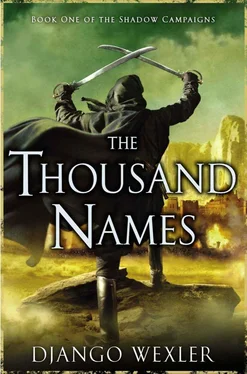Django Wexler - The Thousand Names
Здесь есть возможность читать онлайн «Django Wexler - The Thousand Names» весь текст электронной книги совершенно бесплатно (целиком полную версию без сокращений). В некоторых случаях можно слушать аудио, скачать через торрент в формате fb2 и присутствует краткое содержание. Жанр: Фэнтези, на английском языке. Описание произведения, (предисловие) а так же отзывы посетителей доступны на портале библиотеки ЛибКат.
- Название:The Thousand Names
- Автор:
- Жанр:
- Год:неизвестен
- ISBN:нет данных
- Рейтинг книги:4 / 5. Голосов: 1
-
Избранное:Добавить в избранное
- Отзывы:
-
Ваша оценка:
- 80
- 1
- 2
- 3
- 4
- 5
The Thousand Names: краткое содержание, описание и аннотация
Предлагаем к чтению аннотацию, описание, краткое содержание или предисловие (зависит от того, что написал сам автор книги «The Thousand Names»). Если вы не нашли необходимую информацию о книге — напишите в комментариях, мы постараемся отыскать её.
The Thousand Names — читать онлайн бесплатно полную книгу (весь текст) целиком
Ниже представлен текст книги, разбитый по страницам. Система сохранения места последней прочитанной страницы, позволяет с удобством читать онлайн бесплатно книгу «The Thousand Names», без необходимости каждый раз заново искать на чём Вы остановились. Поставьте закладку, и сможете в любой момент перейти на страницу, на которой закончили чтение.
Интервал:
Закладка:
Django Wexler
The Thousand Names
Prologue
JAFFA
The new supreme rulers of Khandar met in the old common room of the Justices, the cudgel-bearing peacekeepers and constabulary who were now the closest thing the city of Ashe-Katarion had to a civil authority. It was a gloomy space, buried deep in the city’s ancient gatehouse. Jaffa-dan-Iln, as Grand Justice, was the nominal host of the gathering, and he’d done his best to straighten up, removing decades of accumulated rubbish, packs of cards, dice, and misplaced papers. There was no way to hide the marks and patches on the carpets, though, or the plain sandstone walls, devoid of decoration except where some bored Justice had carved them with a belt knife. The table was cheap wood layered with stains, and the chairs were a mismatched set dragged from every room of the gatehouse. Jaffa had rearranged the bookcases and other furniture to at least conceal the more obscene bits of graffiti.
The chime of a bell on the stairs heralded the arrival of the first visitor. General Khtoba entered the room cautiously, as though advancing on an enemy position. He wore his uniform-dun trousers and jacket over a white undershirt, the jacket fringed with gold at the shoulders as befitted his rank. A crimson triangle, open on top like a squat V , had been hastily sewn over his heart to represent the fires of the Redemption. At his side was a sword so filigreed with gold and silver that it sparkled as he moved. Behind him came two other officers of the Auxiliaries, similarly uniformed but less impressively accoutred.
The general looked over the room with barely concealed distaste, selected the least tatty chair, and sat, offering Jaffa only a grunt of recognition. His officers took seats flanking him, as though they expected trouble.
“Welcome, General,” Jaffa said. “Would you care for any refreshment?”
The general scowled. He had a face made for scowls, with bushy eyebrows and lips shadowed by a broad, drooping mustache. When he spoke, gold gleamed on his teeth.
“No,” he said. “I would care to get this over with. Where are the damned priests?”
The bell downstairs rang again, as if to answer this minor blasphemy. There was the sound of a considerable party on the steps, and then the priests of the Seraphic Council entered, all in a gaggle.
Jaffa had grown up knowing what a priest looked like-either an old man, bearded and fat, in gaudy green and purple robes, or else a woman demurely shrouded in silks. This new kind, these hard-eyed young men in spare black wraps, made him uncomfortable. There were no women among their number, demure or otherwise. Their leader was a younger man with close-cropped hair and a scar under one eye who took a seat at the table opposite the general. His flock remained standing behind him.
“I am Yatchik-dan-Rahksa,” he said. “Appointed by the Divine Hand to lead the Swords of Heaven and oversee the final cleansing of foreign taint from our land.”
The name meant “Angel of Victory,” which Jaffa supposed was appropriate enough. The Divine Hand himself had started the fashion for taking the names of angels when he’d called himself Vale-dan-Rahksa, the Angel of Vengeance. At the rate the Council was expanding, there would soon be a serious shortage of angels. Jaffa wondered what would happen when they ran out of manly, intimidating names and were reduced to naming themselves after the Angel of Sisterly Affection or the Angel of Small Crafts.
Khtoba bristled. “That cleansing should have begun weeks ago. The cursed Vordanai were like a fruit in our hands, ripe for the plucking, but they were permitted to escape. Now the task of evicting them will cost many of the faithful their lives.”
“The truly faithful are always prepared to lay down their lives for the Redemption,” the priest said. “But I think you overestimate the difficulty, General.”
“Overestimate?” Khtoba frowned. “Perhaps you’d like to try scaling the walls of Sarhatep without the help of my guns, then.”
Yatchik smiled beatifically. “Walls are no obstacle to the will of Heaven.”
“So the servants of Heaven have discovered how to fly?”
“Sirs,” Jaffa said. “Before we begin, I should remind you that our council is not yet complete.”
“Oh, of course,” the general drawled. “Let us wait to see what a bunch of boy-fucking horse thieves have to say.”
“The gods value all their children,” Yatchik said. “And glory comes to all who serve the Redemption.”
The bell rang a third time before Khtoba could respond. The last member of the council made no noise on the stairs, and entered the chamber with only the slightest whisper of silk. He was dressed in black from head to foot, loose-fitting robes cinched at the waist, wrists, and ankles in the Desoltai style, with a black silk scarf wound around his head. His face was invisible behind his famous mask, a simple oval of brushed steel with two square holes for eyes.
This was Malik-dan-Belial, the Steel Ghost, chieftain of the desert tribes. He had risen to prominence long before the beginning of the Redemption. The Ghost’s Desoltai raiders had been a thorn in the side of the prince and the Vordanai for years, and the Ghost himself was the hero of a hundred stories told in hushed whispers. It was said that he had no face, only an inky void behind the steel mask, and that he’d traded his very identity to a demon for the ability to see the future.
No one rose as he entered, so it fell to Jaffa to greet him. He got up from his seat and bowed.
“Malik,” Jaffa said. The Ghost had never claimed another name or title. “Welcome. Please, take your seat.”
“Yes, welcome,” said Yatchik. “We were discussing plans for the final destruction of the Vordanai. Perhaps you might care to add your opinion?”
“It is too late,” said the Ghost. His voice rasped like silk over steel, harsh with the heavy accent of the desert. “The raschem fleet has arrived, with transports and ships of war.”
“I’ve heard nothing of this,” Khtoba said. “Where did you get this information?”
The Ghost fixed the general with his blank, faceless gaze. “The ships came into sight yesterday evening.”
Khtoba sat tight-lipped. The Steel Ghost had always displayed a remarkable ability to know more than he should. It was just possible that a man on a fast horse, with a string of remounts, could have covered the hundred miles between Sarhatep and the city along the coast road, but Khtoba’s own men had undoubtedly been watching that road and presumably they’d seen nothing. That meant either that some Desoltai messenger had accomplished the same feat cross-country, over the scrubland and desert of the Lesser Desol, or that the Steel Ghost really did have some magic at his command.
“We’ll need to confirm that,” the general said. “If what you say is true, my couriers should bring the news by tomorrow.”
“Even still,” Yatchik said, “we know nothing of their intentions. They may mean to take the prudent course and return to their own lands.”
Khtoba bared his teeth. “In which case we’ve lost our chance for vengeance on the foreigners and their Exopterai dogs.”
“That the Redemption is accomplished is enough,” said the priest. “We need spill no more blood than necessary.”
Jaffa had seen the charnel pits in the great square in front of the Palace. Presumably, Yatchik would say that those deaths had been necessary.
“They will not leave our shores,” the Ghost said. General and holy man both turned to look at him. “The transports are unloading. Men, guns, stores in great quantity.”
“How many men?” Khtoba snapped, his earlier reluctance to accept the Desoltai’s information forgotten.
Читать дальшеИнтервал:
Закладка:
Похожие книги на «The Thousand Names»
Представляем Вашему вниманию похожие книги на «The Thousand Names» списком для выбора. Мы отобрали схожую по названию и смыслу литературу в надежде предоставить читателям больше вариантов отыскать новые, интересные, ещё непрочитанные произведения.
Обсуждение, отзывы о книге «The Thousand Names» и просто собственные мнения читателей. Оставьте ваши комментарии, напишите, что Вы думаете о произведении, его смысле или главных героях. Укажите что конкретно понравилось, а что нет, и почему Вы так считаете.











